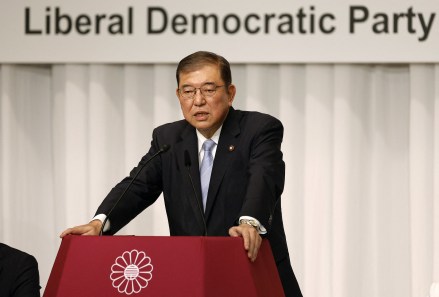Japan’s Prime Minister Shigeru Ishiba is set to meet with US President Donald Trump in Washington today, marking his first face-to-face summit with the newly re-elected president. This meeting holds high stakes for Japan, as it seeks to strengthen its relationship with the US in an increasingly unpredictable international environment.
Japan’s top government spokesperson, Yoshimasa Hayashi, confirmed on February 4 that Ishiba will be in the US from February 6 to 8, hoping to solidify ties with the US administration. “Through this visit, we hope to build a strong relationship of trust and take the US-Japan alliance to new heights,” Hayashi remarked. Ishiba himself has emphasized the importance of strengthening Japan’s strategic partnership with the US, particularly in light of China’s rising military power and the shifting global balance of power.
The meeting comes at a time when tensions between the US and Japan are simmering over economic issues, notably a blocked acquisition of US Steel by Japan’s Nippon Steel. The US administration under former President Joe Biden rejected the $14.9 billion deal, citing national security concerns. With Trump back in office, Ishiba will likely use the opportunity to address this setback and seek to revive the deal, which could be seen as a diplomatic challenge.
Moreover, one of the main agenda items is expected to be an increase in imports of US shale gas to Japan, in line with Trump’s ‘drill, baby, drill’ policy. Tokyo aims to secure more energy resources from the US as part of its broader strategy to reduce dependency on foreign imports and bolster economic ties with Washington.
Japan, which relies heavily on the US for security under the nuclear umbrella, is also likely to address potential concerns over military spending. Ishiba has previously stated that Japan needs to deepen cooperation with the US to ensure regional stability, with discussions expected on future increases to Japan’s defence budget to strengthen its self-defence capabilities.
In addition to these bilateral issues, Japan is also a key member of the Quadrilateral Security Dialogue, which includes the U.S., India, and Australia. Leaders from these four nations are expected to meet later this year in New Delhi, and Ishiba’s discussions with Trump may lay the groundwork for stronger cooperation within the Quad framework. The Quad, which seeks to promote a free and open Indo-Pacific, has become increasingly important in countering China’s growing influence in the region. Japan’s role in the Quad, alongside the US, will be pivotal in shaping the strategic landscape in the Asia-Pacific.
While these discussions are significant, Japan is also focused on showcasing its role as a major foreign investor in the US. He may highlight Japan’s significant economic contributions and the growing investment flows, notably the $100 billion deal SoftBank struck with Trump last year. Both leaders may also discuss expanding cooperation in emerging fields such as artificial intelligence and high-tech industries.
Despite these issues, the relationship between Ishiba and Trump may not mirror the strong personal rapport that existed between the former president and late Prime Minister Shinzo Abe.
For Ishiba, the meeting is not only a test of diplomacy but also a critical moment to solidify Japan’s place in a changing world order, balancing cooperation with the US while safeguarding Japan’s autonomy.
